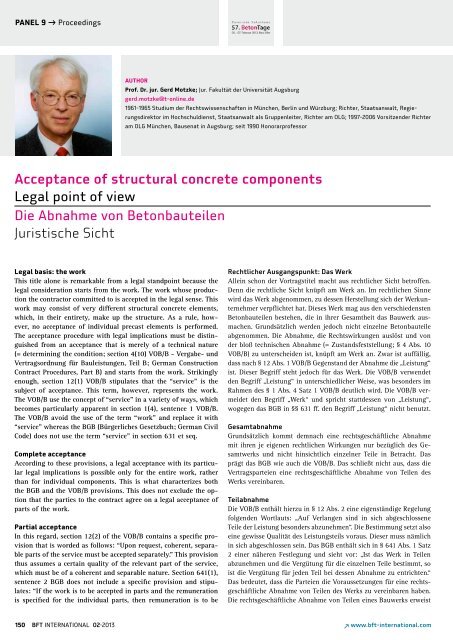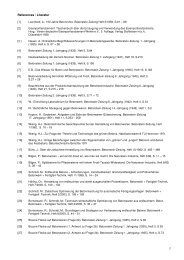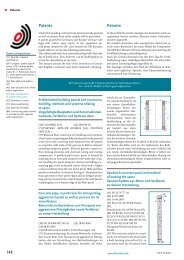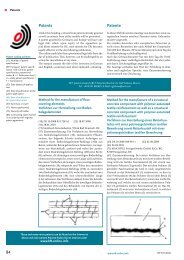KONGRESSUNTERLAGEN | PROCEEDINGS - Bft-international.com
KONGRESSUNTERLAGEN | PROCEEDINGS - Bft-international.com
KONGRESSUNTERLAGEN | PROCEEDINGS - Bft-international.com
Erfolgreiche ePaper selbst erstellen
Machen Sie aus Ihren PDF Publikationen ein blätterbares Flipbook mit unserer einzigartigen Google optimierten e-Paper Software.
PANEL 9 → Proceedings<br />
AUTHOR<br />
Prof. Dr. jur. Gerd Motzke; Jur. Fakultät der Universität Augsburg<br />
gerd.motzke@t-online.de<br />
1961-1965 Studium der Rechtswissenschaften in München, Berlin und Würzburg; Richter, Staatsanwalt, Regierungsdirektor<br />
im Hochschuldienst, Staatsanwalt als Gruppenleiter, Richter am OLG; 1997-2006 Vorsitzender Richter<br />
am OLG München, Bausenat in Augsburg; seit 1990 Honorarprofessor<br />
Acceptance of structural concrete <strong>com</strong>ponents<br />
Legal point of view<br />
Die Abnahme von Betonbauteilen<br />
Juristische Sicht<br />
Legal basis: the work<br />
This title alone is remarkable from a legal standpoint because the<br />
legal consideration starts from the work. The work whose production<br />
the contractor <strong>com</strong>mitted to is accepted in the legal sense. This<br />
work may consist of very different structural concrete elements,<br />
which, in their entirety, make up the structure. As a rule, however,<br />
no acceptance of individual precast elements is performed.<br />
The acceptance procedure with legal implications must be distinguished<br />
from an acceptance that is merely of a technical nature<br />
(= determining the condition; section 4(10) VOB/B - Vergabe- und<br />
Vertragsordnung für Bauleistungen, Teil B; German Construction<br />
Contract Procedures, Part B) and starts from the work. Strikingly<br />
enough, section 12(1) VOB/B stipulates that the “service” is the<br />
subject of acceptance. This term, however, represents the work.<br />
The VOB/B use the concept of “service” in a variety of ways, which<br />
be<strong>com</strong>es particularly apparent in section 1(4), sentence 1 VOB/B.<br />
The VOB/B avoid the use of the term “work” and replace it with<br />
“service” whereas the BGB (Bürgerliches Gesetzbuch; German Civil<br />
Code) does not use the term “service” in section 631 et seq.<br />
Complete acceptance<br />
According to these provisions, a legal acceptance with its particular<br />
legal implications is possible only for the entire work, rather<br />
than for individual <strong>com</strong>ponents. This is what characterizes both<br />
the BGB and the VOB/B provisions. This does not exclude the option<br />
that the parties to the contract agree on a legal acceptance of<br />
parts of the work.<br />
Partial acceptance<br />
In this regard, section 12(2) of the VOB/B contains a specific provision<br />
that is worded as follows: “Upon request, coherent, separable<br />
parts of the service must be accepted separately.” This provision<br />
thus assumes a certain quality of the relevant part of the service,<br />
which must be of a coherent and separable nature. Section 641(1),<br />
sentence 2 BGB does not include a specific provision and stipulates:<br />
“If the work is to be accepted in parts and the remuneration<br />
is specified for the individual parts, then remuneration is to be<br />
Rechtlicher Ausgangspunkt: Das Werk<br />
Allein schon der Vortragstitel macht aus rechtlicher Sicht betroffen.<br />
Denn die rechtliche Sicht knüpft am Werk an. Im rechtlichen Sinne<br />
wird das Werk abgenommen, zu dessen Herstellung sich der Werkunternehmer<br />
verpflichtet hat. Dieses Werk mag aus den verschiedensten<br />
Betonbauteilen bestehen, die in ihrer Gesamtheit das Bauwerk ausmachen.<br />
Grundsätzlich werden jedoch nicht einzelne Betonbauteile<br />
abgenommen. Die Abnahme, die Rechtswirkungen auslöst und von<br />
der bloß technischen Abnahme (= Zustandsfeststellung; § 4 Abs. 10<br />
VOB/B) zu unterscheiden ist, knüpft am Werk an. Zwar ist auffällig,<br />
dass nach § 12 Abs. 1 VOB/B Gegenstand der Abnahme die „Leistung“<br />
ist. Dieser Begriff steht jedoch für das Werk. Die VOB/B verwendet<br />
den Begriff „Leistung“ in unterschiedlicher Weise, was besonders im<br />
Rahmen des § 1 Abs. 4 Satz 1 VOB/B deutlich wird. Die VOB/B vermeidet<br />
den Begriff „Werk“ und spricht stattdessen von „Leistung“,<br />
wogegen das BGB in §§ 631 ff. den Begriff „Leistung“ nicht benutzt.<br />
Gesamtabnahme<br />
Grundsätzlich kommt demnach eine rechtsgeschäftliche Abnahme<br />
mit ihren je eigenen rechtlichen Wirkungen nur bezüglich des Gesamtwerks<br />
und nicht hinsichtlich einzelner Teile in Betracht. Das<br />
prägt das BGB wie auch die VOB/B. Das schließt nicht aus, dass die<br />
Vertragsparteien eine rechtsgeschäftliche Abnahme von Teilen des<br />
Werks vereinbaren.<br />
Teilabnahme<br />
Die VOB/B enthält hierzu in § 12 Abs. 2 eine eigenständige Regelung<br />
folgenden Wortlauts: „Auf Verlangen sind in sich abgeschlossene<br />
Teile der Leistung besonders abzunehmen“. Die Bestimmung setzt also<br />
eine gewisse Qualität des Leistungsteils voraus. Dieser muss nämlich<br />
in sich abgeschlossen sein. Das BGB enthält sich in § 641 Abs. 1 Satz<br />
2 einer näheren Festlegung und sieht vor: „Ist das Werk in Teilen<br />
abzunehmen und die Vergütung für die einzelnen Teile bestimmt, so<br />
ist die Vergütung für jeden Teil bei dessen Abnahme zu entrichten.“<br />
Das bedeutet, dass die Parteien die Voraussetzungen für eine rechtsgeschäftliche<br />
Abnahme von Teilen des Werks zu vereinbaren haben.<br />
Die rechtsgeschäftliche Abnahme von Teilen eines Bauwerks erweist<br />
150 BFT INTERNATIONAL 02·2013 ↗ www.bft-<strong>international</strong>.<strong>com</strong>












